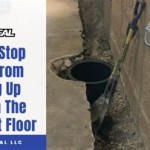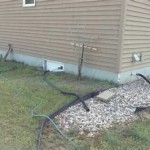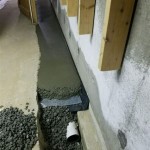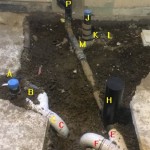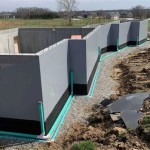Essential Aspects of Floor Drain Backing Up In Basement
Dealing with a floor drain backup in your basement can be an unpleasant and stressful situation. Understanding the potential causes and implementing effective solutions is crucial to prevent further damage and resolve the issue. Here are some essential aspects to consider when addressing a floor drain backup in your basement:
Causes of Floor Drain Backing Up
Identifying the underlying cause of the backup is crucial for determining the appropriate solution. Some common reasons for floor drain backups include:
- Clogged Pipes: Dirt, hair, grease, and other debris can accumulate in the drain pipes, causing a blockage that prevents water from flowing freely.
- Tree Roots: Tree roots can infiltrate and damage underground drainpipes, creating obstructions and leading to backups.
- Broken or Leaky Pipes: Cracks or leaks in the drainpipes can allow water to escape, saturating the surrounding soil and causing backups.
- Frozen Pipes: During cold temperatures, water in the drainpipes can freeze, expanding and blocking the flow of water.
- Septic Tank Problems: If your home is connected to a septic tank, issues such as a full tank or clogged leach field can result in sewage backing up into the floor drain.
Solutions for Floor Drain Backing Up
Once you have identified the cause of the backup, you can implement appropriate solutions to address the issue:
- Clear Clogs: Use a drain snake or auger to remove any debris or clogs obstructing the pipes.
- Cut Tree Roots: If tree roots are causing the problem, you may need to excavate and cut them away from the drainpipes.
- Repair Broken or Leaky Pipes: Broken or leaking pipes require professional repair or replacement to prevent further water leakage and resolve the backup.
- Thaw Frozen Pipes: If pipes are frozen, apply heat using a heat lamp or by pouring hot water over the affected area.
- Inspect Septic Tank: If you suspect septic tank issues, contact a plumber or septic tank professional for inspection and servicing.
Preventive Measures
To minimize the risk of future floor drain backups in your basement, consider these preventive measures:
- Regular Drain Cleaning: Regularly pour a drain cleaner or use a drain snake to clear any potential clogs.
- Control Tree Roots: Plant trees away from drainpipes or use root barriers to prevent root infiltration.
- Insulate Pipes: If your basement is prone to cold temperatures, insulate the drainpipes to prevent freezing.
- Proper Drainage: Ensure that your gutters and downspouts are properly directing water away from your home's foundation, preventing water accumulation around the basement.
- Regular Septic Tank Maintenance: If your home is connected to a septic tank, get it regularly inspected and pumped to prevent potential backup issues.
Conclusion
Floor drain backups in the basement can be inconvenient and potentially damaging. By understanding the causes, implementing effective solutions, and adopting preventive measures, you can resolve these issues and maintain a safe and dry basement. If the problem persists or you encounter any difficulties, it is always advisable to consult a qualified plumber for professional assistance.

Why Does My Floor Drain Back Up Structure Tech Home Inspections

Why Does My Floor Drain Back Up Structure Tech Home Inspections

Basement Drain Backing Up Here S What To Do Right Now Servicemaster

Sewer Backup Basement Drain Flood Causes Cyclone Valves

How To Unclog A Pipes Using Drain Auger Diy Family Handyman

How To Unclog A Pipes Using Drain Auger Diy Family Handyman

How To Fix Basement Floor Drain Backing Up Avalon Home Inspections

Basement Drain Backing Up Here S What To Do Right Now Servicemaster

Why Did My Basement Floor Drain Back Up 1 Tom Plumber

How To Clear A Clogged Floor Drain In Denver
